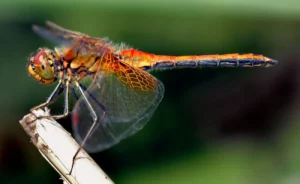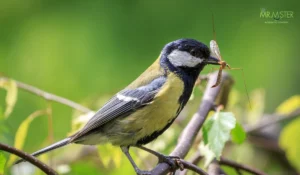READ ALL ABOUT IT
CHECK OUT OUR BLOG FOR CHICAGOLAND & SOUTHERN WISCONSIN
Natural Predators of Mosquitoes: Your Secret Weapon Against Backyard Pests
Bats are amazing creatures – some species can eat up to 1,000 mosquitoes in just a single hour! These natural predators of mosquitoes could be your best defense against those pesky backyard insects!
Nature has created an impressive lineup of mosquito hunters. Dragonflies, also called “mosquito hawks,” are amazing hunters. They have a 95% success rate in catching their prey. On top of that, fish like Gambusia (mosquito fish) have such a huge appetite that they eat up to 167% of their body weight in various invertebrate prey each day. Frogs and toads join this natural pest control team by feeding on both adult mosquitoes and their larvae.
You’ll find ways to turn your backyard into a perfect spot for these mosquito-eating allies in this piece. Let’s avoid chemical sprays. Instead, we can build a balanced ecosystem to control mosquitoes! We’ll show you the best ways to attract these helpful predators and set up the right environment to make your outdoor space more enjoyable.
What Animals Eat Mosquitoes?

Image Source: West Baton Rouge Parish, LA
Mosquitoes may seem like unwanted guests in our yards, but they play a crucial role in many ecosystems. These tiny insects do more than just annoy us as pests – they serve as food for many animals. Let me show you why these buzzing creatures matter so much in the natural food chain.
Why mosquitoes are a food source
These insects comprise a significant portion of the biomass in many ecosystems, particularly in areas with standing water where their eggs and larvae thrive. Their abundance makes them an easy meal for predators. They are found in large numbers in many areas. This makes them the fastest option for getting food. They are everywhere and easy to catch.
These insects exist in different life stages (eggs, larvae, pupae, and adults). This gives food options to various predators in different habitats. Their presence throughout their life cycle makes them a reliable food source.
Types of animals that eat mosquitoes
Nature has blessed us with a variety of mosquito predators:
- Aquatic predators: Fish like catfish, bass, bluegill, and the mosquito fish (Gambusia affinis) eat lots of mosquito larvae. This special fish can devour up to 167% of its body weight in prey daily.
- Insects: Dragonflies and damselflies feast on both adult mosquitoes and their larvae. Dragonflies hunt exceptionally well with their amazing aerial skills.
- Birds: Swallows, purple martins, waterfowl, and migratory songbirds help keep mosquito numbers in check.
- Mammals: Bats eat flying insects, including mosquitoes, though mosquitoes make up less than 1% of their total diet.
- Amphibians: Frogs, toads, and their tadpoles snack on mosquitoes, but don’t depend on them as their main food source.
Mosquitoes in the food chain
Mosquitoes hold a unique spot in the food chain. Fish, turtles, and dragonfly nymphs feed on the larvae of these species. Birds, bats, and other flying insects hunt adult mosquitoes.
Most predators that eat mosquitoes don’t focus solely on them. They eat mosquitoes, among other prey. To name just one example, see the predatory mosquito species in the genus Toxorhynchites – it eats other mosquito larvae but doesn’t limit itself to just mosquitoes.
Natural predation by itself usually can’t control mosquito populations in residential areas. These predators help maintain nature’s balance. They work together to control the number of mosquitoes.
Top 5 Natural Predators of Mosquitoes
Image Source: Mr. Mister Mosquito Control
These five natural predators excel at controlling mosquitoes in nature. Each one has unique hunting abilities that help keep mosquito populations under control.
Bats: Nighttime mosquito hunters
Most people think bats eat lots of mosquitoes, but these insects make up less than 1% of most bat diets. Their effect on mosquito control remains substantial. Research from the University of Wisconsin shows mosquito DNA in over 70% of little brown bat droppings. This suggests bats eat nowhere near the number of mosquitoes we once believed. Nursing or pregnant bats devour insects weighing as much as their body weight each night. Some bats catch hundreds of mosquitoes during their evening hunts. Little brown bats hunt at least nine mosquito species that carry the West Nile virus.
Dragonflies: Aerial predators with precision
Dragonflies, nicknamed “mosquito hawks,” are excellent mosquito hunters both as adults and larvae. Adult dragonflies eat 30-100 mosquitoes each day. Their water-dwelling larvae help control mosquito populations. These remarkable hunters have survived for over 100 million years. A dragonfly’s exceptional eyesight allows it to see almost 360 degrees around itself. Their hunting precision makes them deadly enemies of mosquitoes at every stage of their life cycle.
Birds: Swallows, martins, and more
Many bird species eat mosquitoes. Barn swallows lead the pack as champion mosquito hunters. Purple martins, eastern bluebirds, cardinals, nighthawks, and chickadees also effectively hunt these insects. Each bird has its own hunting style. Swallows and martins catch mosquitoes mid-flight using a technique called “hawking”. Chickadees pick insects from plants and save them for later.
Fish: Mosquito larvae eaters in water
Mosquitofish (Gambusia affinis) earned their name by devouring 100-300 mosquito larvae daily. These small fish eat up to 167% of their body weight in just one day. Guppies, eastern mudminnows, catfish, and bluegill also effectively hunt mosquito larvae. Since the 1920s, people have added mosquitofish to many areas. This was done to help control the number of mosquitoes.
Frogs and Toads: Amphibians that eat both larvae and adults
Adult frogs don’t focus only on mosquitoes, but certain tadpole species actively hunt mosquito larvae. Three North American tadpoles – the spade foot toad, green tree frog, and giant tree frog – feed on mosquito larvae. These amphibians protect us by targeting mosquitoes at different life stages. This makes them valuable partners in detailed mosquito control.
How to Attract Natural Predators of Mosquitoes to Your Yard
Image Source: Homestead and Chill
A backyard ecosystem that welcomes mosquito predators stands out as a natural way to control these annoying insects. Your outdoor space needs just a few simple changes. Soon, you’ll have an army of mosquito-eating allies at work.
Add water features like ponds
A properly designed pond naturally attracts predators of mosquitoes. Your pond should include mosquitofish (Gambusia affinis) as they eat mosquito larvae before maturity. Moving water is most effective since mosquitoes tend to avoid it, while still water attracts them. On top of that, aquatic plants like arrowhead, wild celery, and water horsetail make perfect homes for dragonfly larvae.
Plant native vegetation
Nature’s mosquito predators thrive on insects that native plants bring to your yard. Dragonflies rank as nature’s best mosquito hunters, so plant trees and shrubs around your yard’s edges where they can hide. Black-eyed susan, swamp milkweed, and coneflowers pull these aerial predators right in. Lavender, basil, and rosemary serve a dual purpose by repelling mosquitoes while attracting their natural predators.
Avoid pesticides that harm beneficial insects
Regular insecticides kill both mosquitoes and their natural enemies. The best time to use insecticides is after sunset, when dragonflies and other daytime predators are resting. A better option is mosquito dunks containing BtI, which target only mosquito larvae while keeping beneficial insects safe.
Provide shelter and nesting areas
Your landscape should include rocks, logs, and shrubs as safe spaces for predators. Skeeter Beater Mosquito Control Services helps create eco-friendly solutions that protect the natural habitats of predators. Bat houses and birdhouses bring in flying mosquito hunters. Sticks placed around ponds give dragonflies places to rest. Garden perennials left standing through winter help beneficial insects survive the cold months.
Reduce artificial lighting at night
Artificial light now covers approximately 25% of the Earth’s surface, effectively blurring the distinction between night and day. This change disrupts natural hunting patterns, as many predators rely on darkness to pursue their prey. Motion-activated lights or directional covers help light only the spaces you need. Amber or red lights work better than blue-white ones, as insects tend to pay more attention to blue and white light.
Beyond Predators: Other Natural Mosquito Control Methods
Natural predators are great at mosquito control, but you can boost your defense against these annoying insects with many more strategies. These methods help attract predators. They play a key role in managing mosquitoes.
Use mosquito dunks with Bti
Mosquito Dunks that contain Bacillus thuringiensis israelensis (Bti) give you excellent biological control. These donut-shaped products float on still water. They release bacteria that kill mosquito larvae in just days. A single dunk covers up to 100 square feet of water for 30 days or more. Bti targets mosquito larvae specifically, without harming fish, frogs, pets, or beneficial insects. You can place them in birdbaths, ponds, rain barrels, and anywhere water collects.
Remove standing water regularly
Getting rid of standing water is the quickest way to prevent mosquitoes. Once a week, empty and scrub containers that collect water, including buckets, planters, toys, and birdbaths. Look for hidden water spots in gutters, tarps, and tree holes. Water features require tight-fitting lids or wire mesh with holes smaller than those of adult mosquitoes. A few minutes of cleanup can significantly reduce the number of mosquito breeding sites.
Grow mosquito-repelling plants like basil and lavender
Some plants naturally keep mosquitoes away with their fragrant oils. Mosquitoes can’t smell well around lavender’s rich scent. Basil, especially Thai, lemon, cinnamon, and Peruvian varieties, emits a strong aroma that repels mosquitoes. Lemon balm, eucalyptus, and catnip work well, too. These plants not only repel mosquitoes but also make your garden beautiful and useful for cooking.
Install bat houses and bird feeders
Bat houses set up right draw these nighttime hunters in. They also provide homes for natural predators. You should mount bat houses 15-20 feet high on poles or buildings, facing them south or southeast to catch the morning sun. The best results come when you place them within a quarter mile of fresh water. Bird feeders attract daytime mosquito hunters, such as purple martins, swallows, and bluebirds. Skeeter Beater Mosquito Control Services offers a great way to get eco-friendly help that complements these natural methods.
Natural Predators of Mosquitoes
Natural mosquito control is more effective than chemical solutions alone. Nature’s predators, such as dragonflies, bats, and mosquitofish, are tireless hunters that help keep mosquito populations under control. These natural controllers offer a green approach to managing mosquitoes without the use of harmful chemicals.
You can turn your backyard into a thriving ecosystem where mosquito predators thrive. Water features naturally attract dragonflies and fish. Native plants provide birds and beneficial insects with the habitat they need. The quickest way to reduce mosquito breeding is to remove standing water and install bat houses.
A balanced strategy gets the best results. Attract predators for natural population control. Use mosquito dunks and repellent plants as well. This approach not only reduces mosquito numbers but also brings diverse wildlife to your outdoor space.
Next time mosquitoes crash your backyard party, let these natural allies help instead of reaching for chemical sprays. Your outdoor space will become more enjoyable and balanced. Working with nature creates lasting solutions that help your yard, family, and the environment.


